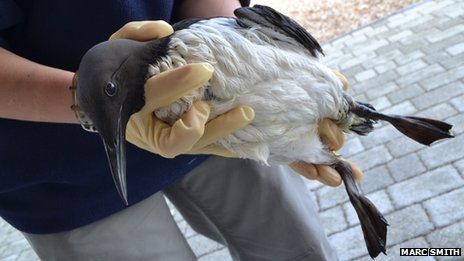Large numbers of the sea birds rescued from the chemical spill on Dorset’s coast are now set to be released in the next two weeks after an unconventional clean-up.
Of the 309 birds originally rescued, 197 are now in rehabilitation and some are set to be released within the next two weeks following a lengthy and experimental cleaning process.
Many of the affected birds, including guillemots and razorbills, had to be put down for compassionate reasons said Peter Venn, the manager of the R.S.P.C.A. centre where the birds are being cleaned and cared for.
Birds polluted by normal crude oil or diesel spills can be cleaned with washing up liquid but it wasn’t successful this time because PIB, the chemical coating the birds, is very sticky, making the birds difficult to clean said Mr Venn
A Dorset Wildlife Trust volunteer who helped the clean up on Chesil Beach said: “There was no way that we or the birds themselves could get the substance off, it was literally like they’d been dumped in glue.”
Mr Venn said: “We have used vegetable oil or spread in the past to remove bats from fly paper so we tried that and it worked.”
The team then had to wash the birds with the usual soapy detergent to remove the oily substance from the birds, of which some are now being rehabilitated in pools.
It takes time however for the birds to be ready for release: “They need to restore their own natural oils through preening in order to stay buoyant,” said Mr Venn, “Just because we wash them and clean them up it doesn’t mean that they will always be able to restore this, we hope most of them will.”
It is now a case of waiting to see how many of the remaining 197 birds get back to full health; Mr Venn estimated that around half of the number originally admitted would make it through recovery.
Calls are being made for tighter restrictions on the release of the sticky chemical which coated the birds, PIB, or polyisobutene, which can be released into the seas legally under certain conditions.
Controls on the transportation, containment and disposal of this and other chemicals are needed says Mr Venn, “Obviously the effect on marine life, especially birds is catastrophic, a lot of products which may have a perfectly safe function could have the potential to be very harmful to marine life if released.”
“I think more checks on the way these chemicals are transported and disposed of are needed.” he said.
Mr Venn said that many more instances like this one could have happened unknown to the public, “The only reason we were aware of this incident is because the winds blew the birds to shore, if this was the case we may never have known.”
A spokesperson from the Chesil Beach Centre who helped the clean-up said: “Certainly the laws should be changed; the amount of incidents that I’ve come across in the last few years is worrying.
“To have it dumped in the water is shocking. We were lucky with the amount that were affected, it could have been far worse.”
MP for South Dorset, Richard Drax has also called for the parliament to clarify the rules surrounding the substance but was unavailable for comment.
Main image credit: Marc Smith








